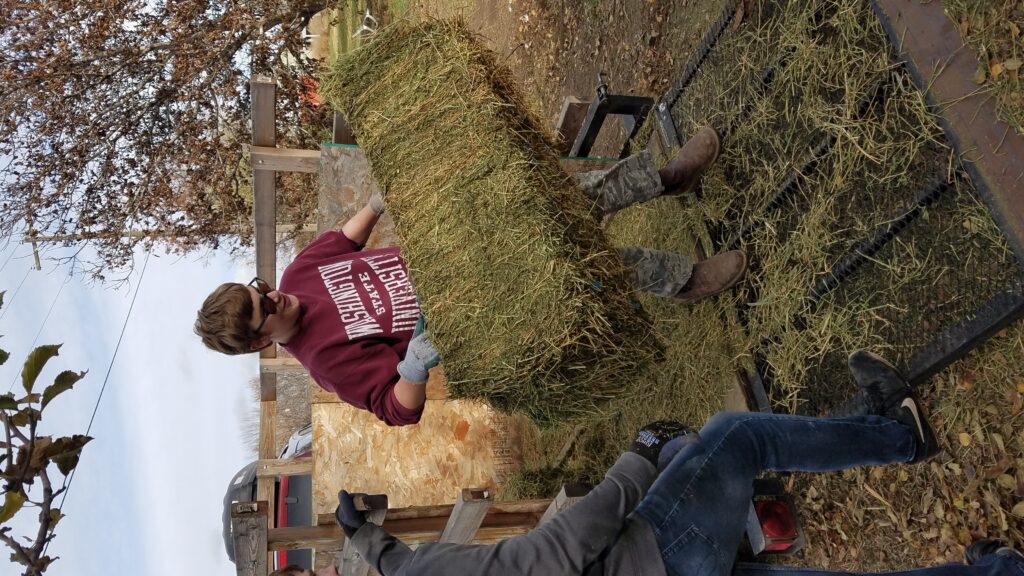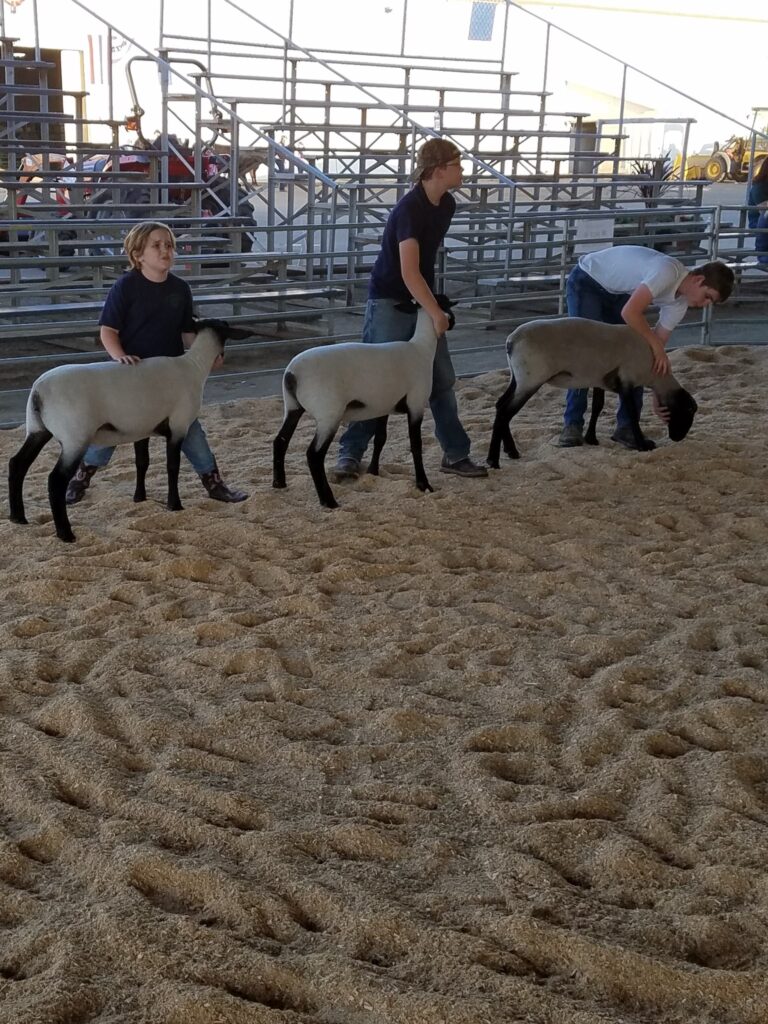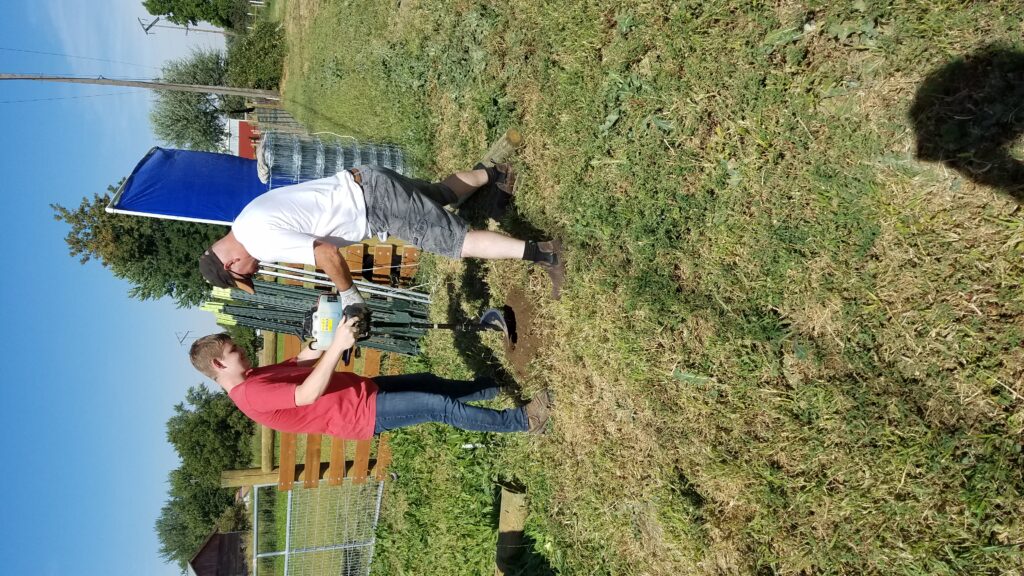For many homeschooling families, the most important part of the day is the life lessons learned. While we want our children to learn about multiplication and division, read classic works of literature, and understand the history of the world, we also want them to be individuals who will be productive and be able to take care of themselves and their own families someday. Combining the homesteading lifestyle with homeschooling is one way that parents can teach valuable life lessons.

In our latest interview in our Homesteading and Homeschooling series, Teresa gives us an inside look into their homesteading lifestyle.
A Peek at a Homesteading Lifestyle
Q. Please tell us about your family and what homesteading means to you. When and why did you start?
A. Several years ago, my husband took a job in a more rural community. We had always wanted to raise our kids in a small town similar to our own childhoods. I had grown up in a small town close to where we now live. My husband grew up on a working orchard. At the time we moved, the three kids still at home ranged from 7 to 12 years old.
Our initial goal was to become more self-sustaining. We wanted to use natural methods to grow our own garden, raise a few chickens, and teach our children in the process.
We had envisioned an established mini-farm on one or two acres of property. What we ended up with is almost five acres of long-neglected fields. When we first moved in, we felt like we had no idea what we were doing. We have all been learning so much as we work to restore the property and live beyond our initial vision.
Q. What is a typical day like for you and your family?
A. Every morning starts with farm chores, and I like to do those myself. By doing the morning tasks I can personally check on all the animals and determine if any extra chores need to be assigned that day. My kids help in the morning if they are up early. I prefer mornings to myself so I can have a quiet devotion time. The kids are responsible for the evening farm chores.

My kids are now all old enough to get themselves going in the morning, but some days they need a little encouragement. On an average morning, they perform brief household chores followed by schoolwork. When they need a break, it’s not uncommon for them to go outside to visit with the sheep or take the ducks and chickens some treats.
Our days seem to change with the seasons. The spring is very busy with lambing, garden preparations, and seeing the farm begin to grow and wake up. Summer is filled with ongoing maintenance and animal care. During the fall, we finish the final garden harvesting and work to winterize the farm. We customarily experience very cold winters so need to keep animals fed and water troughs free of ice.
Q. What about an atypical day? Or a funny event from your homesteading and homeschooling journey.
A. An atypical day would be the next-door neighbor calling to tell me some escaped lambs had spent the night in her driveway.
We’ve had a lot of funny experiences on the farm. Once we had a pair of screech owls trapped in our chimney. Although their eerie cries were not amusing in the middle of the night, learning the source of the noise turned their visit into a homeschool lesson and rescue mission.
Q. How does your family incorporate homeschooling into your homesteading lifestyle?
A. I want my kids to be lifelong learners, and therefore homeschooling has become our lifestyle. Every day we learn something new. There are a lot of lessons in restoring the property and raising animals. My motto is to learn by doing. When my kids have an idea for a new project, like planting their own garden area or building a duck pond, they can do some research and try it.

Q. How would you characterize or describe your homestead? Do you breed and raise animals? If so, which ones? Do you raise crops? Can you share about your farm?
A. We would best be defined as a hobby farm. Initially, we started with a few older chickens that a friend needed to re-home. Each spring a few feed store chicks and ducklings beckon us to take them home.
Our fields are slowly being transformed into fenced pastures. The kids began showing market lambs at our local fair several years ago. One son had wanted to start a breeding project so he used his earnings to purchase two extra ewe lambs. When our local fair was canceled in 2020, all three kids turned their market lambs into youth breeding projects. This last spring we experienced our first lambing season.
Q. What chores do you incorporate into your homeschool schedule?
A. There is nothing specific I add to our homeschool schedule. I use a whiteboard to note any extra chores that need to be done around the house or farm. Unless it’s something requiring immediate attention, the kids usually complete the tasks around or after their bookwork.

Q. What life skills are taught in your homeschool due to your homesteading lifestyle?
A. The skills unique to living on the farm directly relate to growing our own food. My kids are involved in planning, planting, maintaining, and harvesting our garden. Not only do they know how to grow the food, but they feel more motivated to help prepare meals and eat what they have grown.
We have not intentionally raised meat birds, but once had a couple of broilers mixed in with some layer chicks we purchased. One of the boys learned how to raise and butcher them well enough to consider raising more in the future.
Our kids work alongside us on our farm. They are continually learning about the health and needs of our livestock. Raising and selling market lambs has given them some hands-on lessons on the business side of farming.

The character development in my kids is priceless. They may grumble about chores sometimes, but they are growing a strong work ethic. As they help build fences and watch pastures grow, they have a stronger respect for the farm and livestock.
Q. What recommendations would you have for someone who wishes to adapt their homeschooling lifestyle to incorporate homesteading?
A. It’s okay to set books aside to learn by doing. The lessons from homesteading are more important than bookwork. I have moments when I question if I’m doing enough in our homeschool, and I usually realize I’m comparing my kids to the public school model I grew up in.
The school books will be there after you watch the birth of a lamb or look up the best treatment for a sick chicken. Kids are learning how to research, think critically, live more self-sustaining, and so much more.
Q. Are there any unique homeschooling opportunities afforded to you because you are homesteading?
A. We currently have 24 chickens and 14 ducks. The abundance of eggs has been used to set up a homeschool business and learn about entrepreneurship.

We’ve had some hard lessons due to predators. We lost a lot of our chickens in one year to a neighbor’s dog. Not only was it devastating to lose the birds, but resulted in some hard profit and loss lessons for their egg business.
The hands-on animal science experiences cannot compare to textbook lessons.
Q. Is there anything else you would like to share regarding a homesteading lifestyle?
A. Make a plan. Don’t be surprised when your five-year plan turns into a ten-year plan. Your plans will constantly change, and that’s okay. You don’t have to know everything, but it’s beneficial to have a good network of knowledgeable people willing to share their wisdom.

